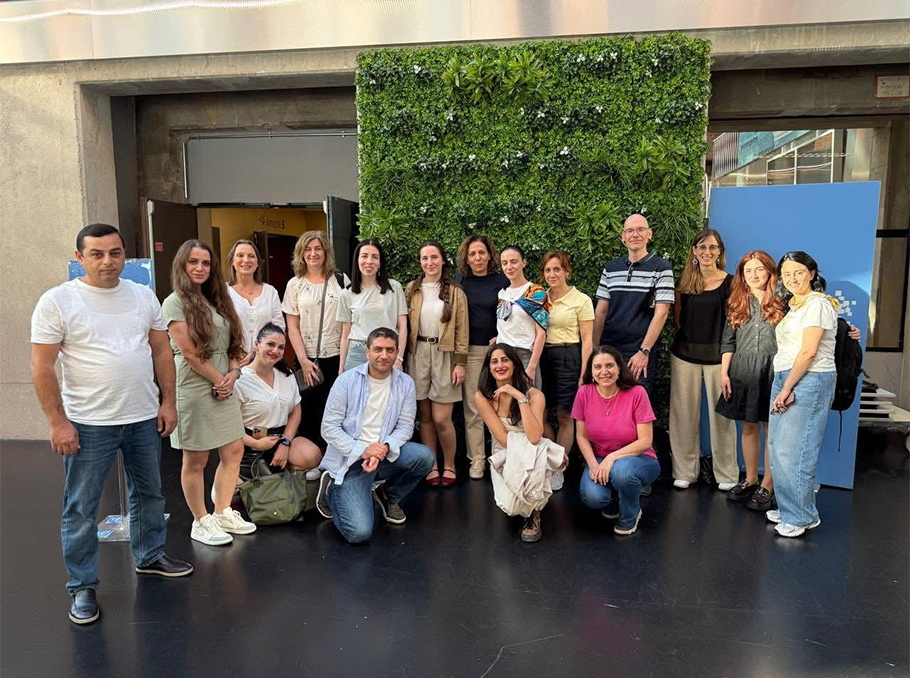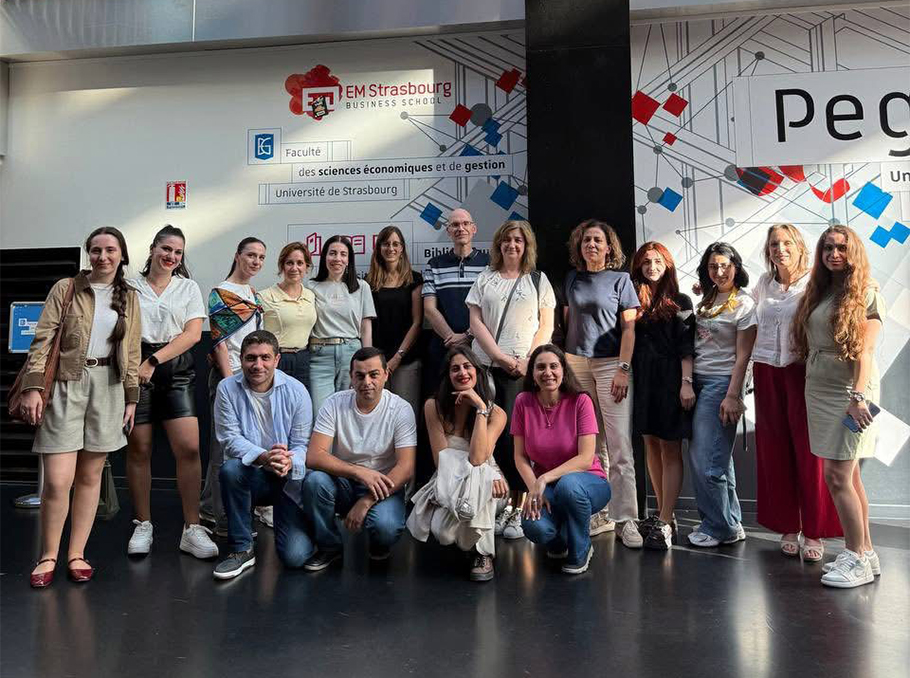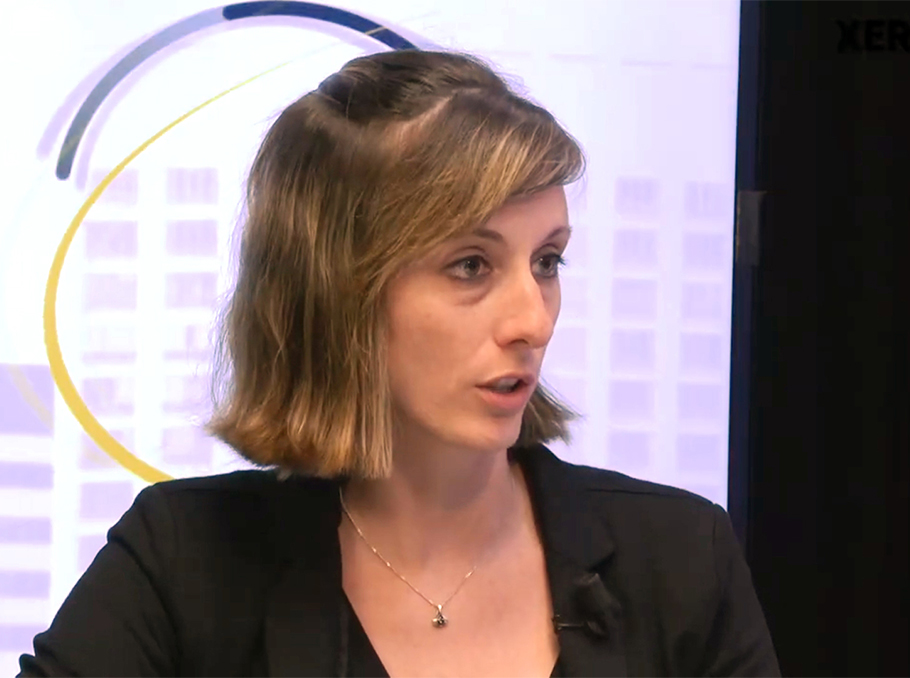In an age of uncertainty and constant transformation, leadership is no longer defined by expertise alone. It demands the capacity to think beyond specific fields, navigate changing realities, and unite people across cultural and professional boundaries.
To explore these topics, Mediamax spoke with Dr. Marion Neukam, Assistant Professor in Innovation Management at the University of Strasbourg and lecturer in the Pan-European Executive MBA programme. In this interview, she shares invaluable insights on navigating challenges in times of uncertainty, the profound differences between short-term courses and MBA education, and the essential qualities of leaders who excel on the international stage.
The Pan-European Executive MBA programme, also delivered in Yerevan, is jointly offered by the University of York Europe Campus and the Faculty of Economics and Management at the University of Strasbourg.
It provides Armenian applicants with the opportunity to obtain a high-quality British and European education and earn two MBA diplomas – from the Universities of York and Strasbourg – while continuing to live, work, and study in Armenia.
- Dr. Neukam, in today’s fast-changing world, managers need both solid management fundamentals and creativity. How do your MBA programme balance these skills?
- In the framework of the Pan-European Executive MBA programme, our specialty in Strasbourg is leading modules on innovation, creativity, open innovation, and similar topics. What is interesting about them is that innovation and creativity, from a theoretical point of view, are actually quite old. It has been about 80 years that we have been talking about innovation and creativity, yet they still remain something that organizations often struggle to put into practice.
For us, it is a pleasure to contribute to this ongoing discussion, and it is always interesting to see how organizations today respond to these concepts. I believe these are indeed crucial competencies – perhaps at least as important as understanding a financial balance sheet – because it is just as vital to have the soft skills needed to react to new situations.

When our students come to Strasbourg for their study week, we examine innovation and creativity from different angles. We have, let’s say, classical teaching modules, where we provide them with theoretical foundations on these topics, but we also include more interactive sessions. For example, last time we had a full day dedicated to resilience and crisis management. We also offered an entire module on sustainability from an international perspective. In addition, we usually do a company simulation game where students have to actively play the role of an organization and manage the entire scheduling process.
By including a wide range of modules, we aim to balance what we might call the hard skills – the fundamental knowledge required when talking about innovation – with the soft skills – personal development, intercultural communication competencies, etc.
- You bring substantial industry experience as an Innovation Manager alongside your academic career. How does this background influence the way you prepare MBA students for leadership roles in innovation and strategy?
- My industrial background showed me that talking to students or to people in the academic field is not the same as talking to industry professionals. Specifically, the vocabulary is not the same, they do not focus on the same things.
I would not say that there is such a big gap regarding the content. However, while using the same approaches – what is different is how they name them.
Here is my favorite example: when I talk to students or to academic people in general, I would call something “ambidexterity,” which means doing two things at the same time – exploring and exploiting knowledge. But “ambidexterity” is a word that is not used in the field. Instead, they would just explain it in a longer way – how can you at the same time innovate and create something new while still exploiting the knowledge you already have within the firm? And like in this example, sometimes there is a need for a sort of linguistic translation between academia and industry.
I have to say, this MBA programme really helps me understand the industry better – to see what is actually going on in companies – and my students contribute a lot to that.
- AI is reshaping how knowledge and creativity are managed within organizations. How do you integrate AI-related insights into your MBA courses, and in what ways is AI present in your classes?
- In general, we do encourage our students to use AI. Since AI-driven tools are already widely used, it is important to know how to integrate them correctly. At the same time, we emphasize the limits of AI and remind students about the importance of verifying any information they obtain by checking it against other reliable sources. In this sense, the academic approach within the MBA programme is crucial, as it helps students understand the difference between AI-generated information, research-based knowledge, and academically trustworthy data.

When using AI in the classroom, we also see how essential soft skills remain. As soon as human minds interact and collaborate, the results tend to be much stronger. We also see that the development of competencies is different depending on whether the work is done by AI or by the students themselves. This is also why we increasingly focus on group workshops and oral presentations.
- Do you think AI will make some parts of the MBA curriculum obsolete, or will it instead increase the demand for broader leadership and innovation management skills?
- I must admit that, as a management teacher working on creativity, languages, and intercultural skills, this is a very intriguing question – and I honestly have no idea where it will lead us in the future. I remain convinced that there are certain areas where the human brain still surpasses any AI solution – particularly in the realm of interpersonal skills. For instance, speaking a language is not only about vocabulary; it is also about accurately understanding and interpreting the behavior of the person in front of you. I would say that no artificial intelligence can make learning a language unnecessary, and the same applies to intercultural competencies. There is no AI that can replace the human ability to sense how another person feels or reacts to a particular topic. Let’s see what the future brings – perhaps AI will support us in these areas, but even then, for an executive, certain human abilities will always remain irreplaceable.
On the other hand, when we look at the past, when automatic calculations became possible, our elders tend to worry because of the fact that we no longer calculate in our minds. I think AI will similarly facilitate our life but more on the operative part than on the interpersonal part.
- As you also teach international and intercultural management, could you please explain how important are those skills for executives willing to work across borders?
- Sometimes, the challenge of intercultural management in Europe is that we tend to underestimate the potential impact of cultural differences. When we travel to, for instance, an Asian country, we naturally expect people to react differently because we recognize that the culture is very different. In Europe, however, we tend to assume that if we are, for instance, French, German, Italian or Spanish, we are similar and therefore pay less attention to intercultural nuances. Yet, it is precisely in such contexts that intercultural management becomes essential, because it allows individuals to step back from personal perceptions and identify whether a misunderstanding or conflict might actually stem from cultural factors.
What I particularly value about our MBA programme is how it combines an international dimension with genuine in-person interaction. Students travel between countries and participate in classes physically. This experience pushes them out of their comfort zone – it requires them to move beyond their own national context, engage directly with others, and truly collaborate face to face. While this can sometimes be demanding, it is also profoundly enriching.
 Dr. Marion Neukam
Dr. Marion NeukamYou can read a book on any management topic you like, but when you are actually working in groups, interacting with people from different backgrounds, and learning to cooperate with them, you develop an invaluable range of soft skills.
- Nowadays, there is also a growing tendency of preferring short-term training or certificate programs over formal education. Why do you think people should still pursue an MBA, and how can such a programme enhances their career development?
- I very much appreciate short-term trainings. Many of them are excellent for preparing people for a new job, opportunity, or project. They are incredibly effective for learning the operational or technical aspects. For example, you can take a short course on what a balanced scorecard is, or how to read a financial balance sheet, and you will gain practical tools. But the key difference between operational skills and management skills lies in how you approach a project. It is less about the content itself and more about how you analyze a situation, address challenges, and lead your team through conflicts and uncertainty.
Developing these abilities requires more than just technical knowledge – it takes personal experience and reflection. In the MBA programme, for instance, students must write a master’s thesis. They have to identify a problem, review existing literature, collect data, think critically about possible solutions, and eventually propose new ones. This process takes time: you need to think, to struggle, sometimes take wrong turns and after discover entirely new perspectives. You cannot achieve that in two months: it requires discussion with peers, learning from others’ experiences, and allowing new ideas to emerge.
While short-term trainings are excellent for technical and operational skills, MBA programmes are uniquely effective for developing long-term experience and the deeper human skills that truly shape leaders.
- In your view, what sets Pan-European Executive MBA programme graduates apart in today’s context of uncertainty and rapid transformation?
- We recently had a discussion with the dean of our faculty on this topic. His vision is that, in order to remain resilient in times of uncertainty, one must focus on diversification – diversification of knowledge and skills. The Pan-European Executive MBA programme is one of those truly comprehensive courses where you are exposed to a wide variety of subjects.
At the moment when you study a particular module, you might think that some elements are not immediately useful – perhaps you do not feel the need to take a module on innovation or stress management right now. But at some point, when a crisis arises – and we never know what will come next – this broader approach to management enables you to respond more effectively.
On the other hand, I am convinced that, despite the uncertainties we may encounter, globalization remains a defining factor. No matter what happens, people will continue to collaborate. Thanks to technological possibilities, international cooperation will continue to grow. And in this regard, the MBA programme does something remarkable by bringing together people from different countries to discuss shared challenges and realize that, in the end, organizations everywhere face similar issues.
Gaiane Yenokian talked to Dr. Marion Neukam

















